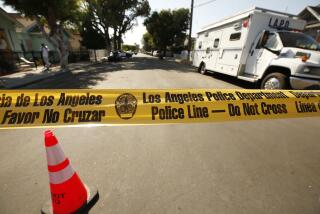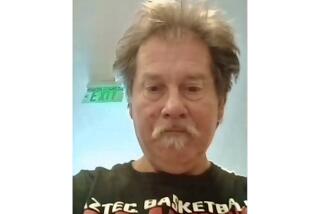Tobacco Firm Assails Film’s Allegation
- Share via
With the motion picture saga of tobacco whistle-blower Jeffrey Wigand days from release, Wigand’s former employer Brown & Williamson Tobacco Co. said Friday it had obtained evidence that Wigand manufactured his claim that he received death threats.
The company posted on its Web site an affidavit in which an FBI agent said there was “probable cause” to believe a threatening letter and a bullet found in Wigand’s mailbox in 1996 were planted by Wigand.
The U.S. attorney’s office in Louisville, Ky., conducted an investigation at the time and concluded that there was insufficient evidence to prosecute Wigand for lying. Federal prosecutors also concluded there was insufficient evidence to prosecute Brown & Williamson for threatening him, according to sources knowledgeable about the probe.
Wigand, 56, B&W;’s former vice president for research and development, is the highest-ranking cigarette industry official to defect. In testimony and in a 1996 “60 Minutes” interview, he accused then-B&W; president Thomas Sandefur of perjury when he joined other tobacco CEOs in testifying before Congress that they did not believe nicotine was addictive.
He also said B&W; forbade him to work on development of safer cigarettes, and fired him after he protested the use of a cancer causing flavorant, coumarin, in a pipe tobacco.
B&W; officials have disputed all of Wigand’s charges and mounted a full-scale public relations effort to discredit him.
The Disney film about Wigand, “The Insider,” is scheduled for general release Friday. It includes a riveting scene in which Wigand finds a bullet in his mailbox, and suggests that B&W; is behind this and other threats intended to prevent him from cooperating with federal criminal authorities, anti-tobacco attorneys, and CBS’ “60 Minutes” news magazine show.
B&W; has repeatedly argued that the film’s portrayals of Wigand as hero and B&W; as villain are massive distortions.
“The question now,” B&W; said in a Friday press release, “is how can Disney continue to promote a film based on fabrications and lies.”
Two Brown & Williamson spokesmen, Mark Smith and Joe Helewicz, said that the cigarette company was not specifically asking the Walt Disney Co. to pull the movie.
“We have not seen the movie,” Helewicz said. “We are going on the basis of what we have heard and the trailers. Without having seen the movie, it’s very difficult to say, ‘Don’t release the movie.’ ”
Helewicz said that B&W; has “put Disney on notice that they should be careful not to malign B&W; and/or its employees.”
John Dreyer, Disney’s senior vice president of corporate communications, said “at first blush we were surprised that [B&W;] would take this tactic.” However, he added, “if you look at it a second time, they are imitating behavior portrayed in the movie--trying to intimidate Wigand to keep him [from] going on CBS or talking to the public.”
Referring to B&W;’s release of the allegations just as the movie was about to hit the theaters, Dreyer quipped, “I guess they wanted to help promote the movie.” He said Disney had no plans to either alter the film or halt its release.
When asked about the timing of its disclosure, B&W; spokesman Smith said the company got the affidavit only two days ago from a Louisville television reporter. Two television stations in Louisville aired segments on the affidavit Thursday night.
Wigand, who now runs an anti-smoking program for children in Charleston, S.C., could not be reached late Friday, but his lawyers characterized the effort as but the latest move in a long-running campaign of character assassination.
“B&W; is deathly afraid of the movie and is out to smear Jeff Wigand,” said Laura Wertheimer, one of the attorneys.
During the tumultuous months in which he emerged as a key witness and anti-smoking hero, Wigand reported receiving threats against himself and his family.
After investigating his claims, FBI Special Agent Edmund V. Armento said in his affidavit there was “probable cause to believe” that Wigand had filed a false crime report concerning the threatening letter and bullet he reported finding in his mailbox the previous month. The affidavit was filed in support of a request for a warrant to search Wigand’s home and seize his personal computer.
A federal law enforcement official told The Times that the U.S. attorney’s office in Louisville conducted a criminal investigation in an effort to determine if Wigand had fabricated reports of death threats, and, if not, who was trying to prevent him from testifying through terrorist threats.
The probe was eventually dropped because “the evidence that he had done it himself was not conclusive, [and] the evidence that it had been done to him was not conclusive,” the official said.
The affidavit said Wigand’s former wife and one of his daughters had seen him wearing gloves as he worked at his computer in his basement office, which Wigand had explained by saying he was cold.
And it said that an FBI computer expert had found distinctive words from the threatening message stored in the computer.
However, the affidavit also said Wigand and a private security officer guarding the Wigand home had both copied portions of the message into the computer, which could explain the FBI expert’s finding. The affidavit said the security officer suspected Wigand of creating the threatening letter and typed it into his computer to compare a printout version with the letter.
Wertheimer, Wigand’s lawyer, said a search warrant is by nature “an advocacy document” in which investigators insert “hearsay and rumor and speculation” to try to win approval to examine evidence.
She said she is “absolutely” sure Wigand did not concoct the threats and that “someone who didn’t agree with his views did. . . . But that doesn’t mean that anyone connected with Brown & Williamson did.”
Jack Paladino, a San Francisco private investigator who played a key role in efforts to rebut B&W; allegations that Wigand was a liar, also scoffed at the affidavit. “They found nothing. . . . If they had found something, the government would have gone after him,” Paladino said Friday night.
Moreover, Paladino said that Wigand voluntarily consented to the computer search.
In January 1995, about the time of Wigand’s death threat reports, B&W; gave several news organizations a thick dossier portraying Wigand as an unsavory character who had been arrested for shoplifting and sued for failing to pay child support. However, the attack backfired, as on close examination many of the allegations of misconduct appeared to be unsubstantiated or simply trivial.
The film tells the story of Wigand’s relationship with CBS producer Lowell Bergman and Bergman’s struggles to get the Wigand interview on the air. B&W; is not alone in complaining that the film takes liberties with the facts. “60 Minutes” correspondent Mike Wallace has also complained that he is unfairly portrayed as an apologist for corporate officials at CBS who feared that a lawsuit by B&W; might interfere with the network’s acquisition by Westinghouse Electric Corp., which was pending in 1995.
Like Wigand, Scruggs, Bergman and Paladino attended a Thursday night premiere of “The Insider” in Beverly Hills, as did Mississippi Atty. Gen. Mike Moore, another key player in the cigarette wars.
In its closing credits, the film acknowledges that certain events were fictionalized for dramatic effect and that there is no proof that B&W; threatened Wigand. Indeed, the movie depicts some menacing encounters that neither Wigand nor anyone else says actually happened.
Included is a scene in which Wigand’s wife watches in horror as an e-mail death threat scrolls across the home computer.
More to Read
The biggest entertainment stories
Get our big stories about Hollywood, film, television, music, arts, culture and more right in your inbox as soon as they publish.
You may occasionally receive promotional content from the Los Angeles Times.










